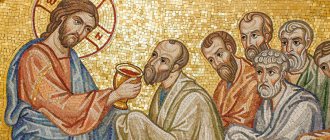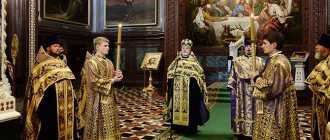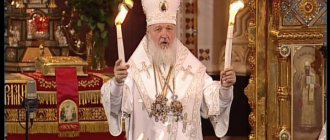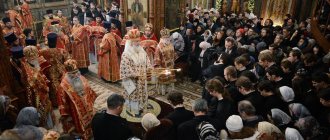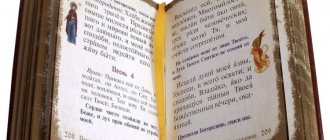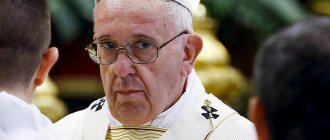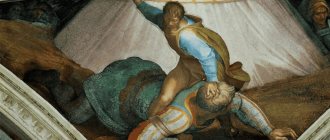Proskomedia
The priest and deacon read prayers called “entrance” in front of the closed royal doors, then enter the altar and put on sacred vestments.
The priest performs actions over five special loaves - prosphoras - that symbolize the sacrifice. It is at this time that Transubstantiation takes place - wine and bread become the Holy Gifts, the blood and flesh of Christ.
Concluding the Proskomedia, the priest blesses the censer and asks God to bless the Holy Gifts - bread and wine. All this time, the altar remains closed, and the reader on the choir reads the Book of Hours.
New Martyrs and Confessors of Russia
Hieromartyr Alexander Talyzin (August 15, 1870 - February 20, 1938)
“I don’t have any connections either in the Krasnokholmsky district or outside the Krasnokholmsky district with anyone except my sons. I have not and do not conduct any anti-Soviet agitation, and I do not plead guilty to this.”
More details
At this point, the interrogation was completed, and the investigator, not having materials proving the crime, called the witnesses on duty, and they signed the necessary testimony.
On February 12, the investigation was completed, and on February 13, the NKVD troika sentenced Father Alexander to death. Priest Alexander Talyzin was shot on February 20, 1938 and buried in an unknown mass grave.
Father Alexander served for many years in the churches of the Tver diocese, and his last place of service - after a two-year exile - was the village of Shablykino, Krasnokholmsky district. The Church of the Intercession of the Blessed Virgin Mary in the village of Shablykimno was built in 1895 and recreated in 1994.
Collapse
Hieromartyr Alexy Troitsky (1875-1942)
Listen to the story about a priest who was ordained after the revolution and served in Kolomna and Fili on Radio Vera.
Liturgy of the Catechumens
A catechumen is a person who undergoes the catechumen - preparation for the Sacrament of baptism, during which he learns the basics of the Christian faith. Nowadays, people are most often baptized in infancy, so the question of announcement is not raised, but the name of the second part of the liturgy has been preserved. Everyone is allowed to attend this part of the liturgy - both baptized and unbaptized.
“Bless, lord!” - exclaims the deacon. In response, the priest, still in the altar, pronounces words glorifying the Holy Trinity, which the choir ends with the word “Amen”.
The priest prays in the altar, the deacon calls on those gathered: “Let us pray to the Lord in peace.” He then pronounces the great litany, which lists the various petitions to God.
The choir sings psalms and hymns, after which the royal doors open, and the priest and deacon leave the altar through the northern entrance, bringing out the Holy Gospel. This is called a "small entrance".
The choir sings a few prayers, then the priest exclaims: “Let us hear!” (let’s listen), and the reading of a fragment from the “Acts of the Apostles” begins. At this time, the priest walks around the temple, censing. Then the choir sings: “Hallelujah!”, and the central moment of the Liturgy of the Catechumens begins - the reading of a fragment from the Gospel.
The reading is followed by a prayer for living and dead Christians.
The Liturgy of the Catechumens ends with the priest’s call: “Catechumens, come forth!”
Sunday Home Worship
Since the times of the Apostles, Christians have celebrated the Day of the Lord - the day of the Resurrection of the Savior - with Liturgy. Over time, the need to participate in church services on Sundays was determined in the 80th rule of the VI Ecumenical Council[1].
This is how we become sanctified—we try to sanctify our lives.
Sanctify the day - begin and end the day with prayer.
To sanctify the week is to turn the seventh day to God, to the temple.
To sanctify the year is to live in the rhythm of church holidays and fasts.
This cyclicality and rhythm sets the tone for the life of the whole family. And children are born and grow up in this rhythm. This rhythm in itself does not teach us, does not in itself lead to God - but it really helps both us and our children to follow this path. It does not allow us to forget in the bustle of weekdays and everyday worries - about what we live for, for Whom we raise our children, To whom we decided to devote ourselves and our whole lives.
And such a life does not complicate in any way, but, on the contrary, greatly simplifies our task - to take care of raising our own children.
But what should we do if we cannot go to temple if the temples are closed? What should we do now that we are in quarantine due to an epidemic? And in this troubled situation, it is possible, and I am sure, that we need to single out Sunday as a special day, as God’s day. Honor this day by declaring it a day off (when children are in distance learning, the day off becomes even more important than usual!). Prepare a special, festive breakfast on this day. And be sure to start the day with worship. Despite the locked doors of our houses and our churches - from worship.
Obednitsa
It’s not necessary to wake up early – let’s take the opportunity to sleep off. As soon as we got up, we washed ourselves, put ourselves in order, and dressed decently. They lit a lamp in front of the icons, burned incense... And now they were ready for the service.
If there are adults in the family, then you can simply read and sing together the three Hours - the First, Third and Sixth, then the Rite of Fine, and the Obednitsa. But if the family has small children or not so “actively willing” teenagers, then it is quite possible to limit yourself to one Rank of Fine Arts. Not to say that this is a very short service, but, in my opinion, it is quite possible to read it even with small children. When children are no older than 4–5 years old, parents will pray, children will tinker around somewhere. When children are 5–7 years old, they can already stand up for such a prayer. Over 7–8 – they can already actively participate, sing, and read something themselves. However, all children are different, and how everything turns out depends on the specific family.
The Fine Hours begin with bows:
“Come, let us worship the King our God. Come, let us worship and fall down before Christ, our King God. Come, let us worship and fall down before Christ Himself, the King and our God.”
Then you can read, but it is much better to sing, because the angels in heaven sing, glorifying God, and since the times of the apostles, Christians have sung during worship.
If the children do not know these psalms by heart, you can print them out in advance or distribute the texts of the regular Liturgy to the children - all these psalms are there, at the very beginning of the Liturgy of the Catechumens:
Psalm 102:
Bless, my soul, the Lord, and all that is within me, His holy name. Bless the Lord, my soul, and do not forget all His rewards, who cleanses all your iniquities, heals all your ailments, delivers your life from corruption, crowns you with mercy and bounty, fulfilling Your desire is good: your youth will be renewed like an eagle. Show mercy, Lord, and the fate of all those who are offended. He told Moses His ways, His desires to the sons of Israel: The Lord is generous and merciful, long-suffering and abundantly merciful. He is not completely angry, he is at enmity forever, he did not create for us to eat because of our iniquity, but because of our sin he gave us food to eat. As the height of the heavens from the earth, the Lord established His mercy on those who fear Him. As far as the east is from the west, he has removed our iniquities from us. As a father gives generously to his sons, the Lord provides generously to those who fear Him. As He knew our creation, I will remember him as the dust of Him. Man, like the grass of his days, like the flower of the field, so he will bloom, like the spirit has passed through him, and he will not be, and no one will know his place. The mercy of the Lord is from everlasting to everlasting on those who fear Him, and His righteousness is on the sons of sons, who keep His covenant and remember His commandments to do. The Lord has prepared His Throne in Heaven, and His Kingdom possesses all. Bless the Lord, all His angels, who are mighty in strength, who do His word, so that they may hear the voice of His word. Bless the Lord, all His Powers, His servants, who do His will. Bless the Lord, all His works, in every place of His dominion.
Bless, my soul, the Lord, and all that is within me, His holy name. Blessed are you, Lord.
Glory to the Father and the Son and the Holy Spirit.
Psalm 145:
Praise the Lord, my soul. I will praise the Lord in my belly, I will sing to my God until I am. Do not trust in princes, in the sons of men, for there is no salvation in them. His spirit will depart and return to his land. On that day all his thoughts will perish. Blessed is the God of Jacob, his Helper; his trust is in the Lord his God, who created the heavens and the earth, the sea and everything that is in them, who keeps the truth forever, who brings judgment to the wronged, who gives food I feel for those who are hungry. The Lord will decide those who are chained. The Lord makes the blind wise. The Lord raises up the downtrodden. The Lord loves the righteous. The Lord protects strangers, He will accept the orphan and the widow and destroy the path of sinners. The Lord, your God, will reign forever in Zion, forever and ever.
And now and ever and unto ages of ages. Amen.
Then we sing the hymn “The Only Begotten Son,” which is probably familiar to children. If the children don’t know him and if we ourselves don’t know him, this is probably the best reason to get to know him. This hymn was composed by the Byzantine emperor Justinian the Great. In 534, the emperor commanded “The Only Begotten Son” to be sung in church - and so we sing.
The hymn “Only Begotten Son” is the most important: it emphasizes the provisions of the Orthodox Creed about Jesus Christ
The hymn “The Only Begotten Son” repeats and emphasizes the provisions of the Orthodox Creed about the second Person of the Holy Trinity - Jesus Christ. You can tell your children about this in advance. And it is good - just before this Obednik, so that first there is a presentation of the material, and here, during home worship, there is consolidation, mastery, and revitalization of this “passed through.” Let’s just look at the text: it’s simple, and there’s nothing to translate here, just understand it and make it out. This hymn says that Jesus Christ
- The Only Begotten Son and Word of God,
- Immortal,
- became a real man, without ceasing to be God,
- received a human body from the Holy Mother of God and Ever-Virgin Mary,
- was crucified
- By his death he conquered death,
- One of the Persons of the Holy Trinity,
- Glorified along with the Father and the Holy Spirit.
And now we sing, and the children now - there is a chance - will hear not an incoherent melody, but these words that are most important for our faith:
Only Begotten of the Son and Word of God, Immortal and willing for our salvation for the sake of being incarnate from the Holy Theotokos and Ever-Virgin Mary, immutably human, crucify, O Christ God, dare trampling death, the One of the Holy Trinity, glorified to the Father and the Holy Spirit, save us.
And then we'll eat again. These are the words of the Gospel. First - the words of the prudent thief, spoken by him on the cross. And then - the words of Christ Himself, literally singing the Sermon on the Mount:
In Your Kingdom, remember us, Lord, when You come, in Your Kingdom. Blessed are the poor in spirit, for to them is the Kingdom of Heaven. Blessed are the mourners, for they will be comforted. Blessed are the Crotzians, for they will inherit the earth. Blessed are those who hunger and thirst for righteousness, for you will be satisfied. Blessed be the mercy, for you will receive mercy. Blessed are those who are pure in heart, for they will see God. Blessed are the peacemakers, for these shall be called the sons of God. Blessed Ones drive out the truth for the sake of them, for those are the Kingdom of Heaven. Blessed indeed, when they revile you, and marry you, and speak every evil word against you, who lie for My sake. Rejoice and be glad, for your reward is abundant in Heaven.
Let us hope that our children are familiar with the beatitudes. But if not, this is just another reason to talk to them. Probably not now, but in advance. And you can explain incomprehensible expressions, of which again there are not so many:
- “the poor in spirit” do not boast or be proud;
- “those who mourn” cry about their sins;
- “the meek” patiently endure difficulties and insults;
- “peacemakers” try to live peacefully and make peace with each other;
- “Blessed are you when they revile you, and ridicule you, and say all kinds of evil verbs” - blessed are you if you are scolded, offended, and unfairly accused (if you endure it for the sake of Christ).
After this, you can sit down (this will be a change of activity and will also emphasize reverence for the upcoming Gospel). And one of the older children or mother reads the Apostolic reading of the day (which one can be seen here).
We read the Apostle - we get up. And the Pope, as the main one, as the priest of our small Church, reads the Gospel of the day (see the same place). It seems to me that it is better to read the Apostle with children in Russian, but the Gospel in Church Slavonic. After the reading of the Gospel, there is a sermon in the church, during which the priest explains what was read. Here we can also sit down again and we can discuss this reading (father and mother discuss, children listen or, if desired, join in the discussion). Or read the interpretation of this passage by St. Theophan the Recluse. Or you don’t have to linger and continue praying.
Sing again - this time exactly familiar - a confession of our faith, a brief and accurate statement of the foundations of Christian doctrine.
We celebrate each member of the Creed by ringing a bell, just as a bell is struck at the Liturgy
The Creed consists of twelve parts (members), each of which contains a special truth (dogma) of the Orthodox faith. At the Liturgy, each member of the Creed is marked by ringing a bell - and here, so that children in the future will pay attention to such bell ringings in the church, and in order to now diversify our home worship a little, you can ask one of the children to ring the bell, marking these members. Noting - precisely in order to break the habitual, too familiar from childhood and therefore illegible unity of these great words.
Symbol of faith:
- I believe in one God, the Father Almighty, Creator of heaven and earth, visible to all and invisible.
- And in one Lord Jesus Christ, the Son of God, the only begotten, who was born of the Father before all ages. Light from Light, true God from true God, begotten, uncreated, consubstantial with the Father, to whom all things were.
- For our sake, man and our salvation, who came down from heaven and became incarnate from the Holy Spirit and the Virgin Mary and became human.
- Crucified for us under Pontius Pilate, and suffered and was buried.
- And he rose again on the third day according to the Scriptures.
- And ascended into heaven, and sits at the right hand of the Father.
- And the one who is to come will judge with glory the living and the dead, His Kingdom will have no end.
- And in the Holy Spirit, the Lord, the Life-Giving One, who proceeds from the Father, who is with the Father and the Son, we are worshiped and glorified, who spoke the prophets.
- Into one Holy, Catholic and Apostolic Church.
- I confess one baptism for the remission of sins.
- Teaching the resurrection of the dead,
- and the life of the next century.
Amen.
Then dad, or mom, or one of the children (if there is a teenager who is a little restless at this moment standing somewhere on the side, you can ask him to read it; but if he doesn’t want to, it’s better, I’m sure, not to reproach, not to force , and read for yourself):
Ease, forgive, forgive, O God, our sins, voluntary and involuntary, even in word and in deed, even in knowledge and not in knowledge, even in days and in nights, even in mind and in thought, forgive us all, I ko Blag and Lover of Humanity.
And then again we all sing together the prayer given to us by the Lord Himself:
Our Father, who art in Heaven, hallowed be Your name, Your kingdom come, Your will be done, as it is in Heaven and on earth. Give us this day our daily bread; and forgive us our debts, just as we forgive our debtors; and do not lead us into temptation, but deliver us from the evil one.
After this, you can sing or read the troparia and kontakion of the day. For example, next Sunday is the memory of the Venerable Mary of Egypt, and it would be good to read the troparion dedicated to her. Besides, we were at Mary’s station and most likely read the life of this saint to the children - and here is a reason to glorify this saint, already familiar to us.
Let small children read the prayer “Lord, have mercy”: in this way they too will be involved in our worship
Then we read the prayer “Lord, have mercy” - 12 times. Anyone, even a small child, can be asked to read this prayer - both at 5 and even at 4 years old a child is capable of this. If there are several children, then you can distribute: you read three times, then you read three times... This way we involve all our children in active participation.
Then dad, or mom, or one of the children who has not read anything yet, reads the prayer:
All-Holy Trinity, Consubstantial Power, Indivisible Kingdom, all good wines: be kind to me, a sinner, affirm, enlighten my heart and take away all my filth. Enlighten my thought, let me glorify, sing, and worship, and say: One is Holy, One is Lord, Jesus Christ for the glory of God the Father, amen.
Then we sing the words of the Old Testament righteous man Job:
May the name of the Lord be blessed from now to eternity. Three times.
And again the psalm, we sing again:
Psalm 33:
I will bless the Lord at all times; I will put His praise in my mouth. My soul shall glory in the Lord, that the meek may hear and rejoice. Magnify the Lord with me and let us exalt His name together. Seek the Lord and hear me, and deliver me from all my sorrows. Come to Him and be enlightened, and your faces will not be ashamed. This beggar cried out, and the Lord heard him, and saved him from all his sorrows. The Angel of the Lord will encamp around those who fear Him, and will deliver them. Taste and see that the Lord is good; Blessed is the man who trusts in Nan. Fear the Lord, all you saints, for those who fear Him will have no hardship. The poor and the hungry are rich, but those who seek the Lord will not be deprived of any good. Come, children, listen to me, I will teach you the fear of the Lord. Who is the man who, even if he lives, loves the days of seeing good things? Keep your tongue from evil, and keep your lips from uttering flattery. Avoid evil and do good. Seek peace and get married. The eyes of the Lord are upon the righteous, and His ears are upon their prayer. The face of the Lord is against those who do evil, even to consume their remembrance from the earth. You cried out for righteousness, and the Lord heard them, and delivered them from all their sorrows. The Lord is near to those who are broken-hearted, and will save those who are humble in spirit. There will be many sorrows for the righteous, and the Lord will deliver them from all of them. The Lord protects all their bones, not one of them will be broken. The death of sinners is cruel, and those who hate the righteous will sin. The Lord will deliver the souls of His servant, and all who trust in Him will not sin.
We end the service with a familiar prayer - praise to the Mother of God:
It is worthy to eat as the truly blessed Thee, the Mother of God, / the Ever-Blessed and Most Immaculate and the Mother of our God. The most honorable Cherub / and the most glorious without comparison Seraphim, / who gave birth to God the Word without corruption, / the real Mother of God, we magnify Thee.
Glory, and now, Lord have mercy, three times.
Lord Jesus Christ, Son of God, through the prayers of Thy Most Pure Mother, our venerable and God-bearing fathers (saints of the day) and all the saints, have mercy and save us, for He is Good and Lover of Mankind. Amen.
After this, you can give the children a piece of prosphora; if you have any, there’s probably some left over! – bit by bit from Artos.
And then there is always a meal, a small feast on the mountain in honor of Little Easter, in honor of Sunday. To show on an edible level how special and important today is. To connect the idea of home service, of prayer, with the Holiday, which is not only great, but also simply delicious.
However, if this short Obednik seems too long, then it is better to shorten it than not to pray at all on Sunday morning. As a shortcut, we can probably suggest singing only one of the psalms, reading the Gospel of the day, singing the Creed and the Lord’s Prayer, and ending with singing “It is Worthy to Eat.” If even this seems overwhelming, you can only read the Gospel, the Creed and the Lord’s Prayer, and this short one is still better than nothing at all. Better than waking up on Sunday and sitting in front of the computer with a sandwich in hand... Better than starting this Lord's Day with cartoons or even lessons. After all, by turning especially one of the days of the week to God, we turn our whole life in the right direction. We ask God for blessings on our every day, on our entire home. Blessings, without which one cannot reach the threshold. Especially now, in times of testing...
You can buy Anna Saprykina’s book “Mother’s Notes” here:
- in the retail online store of the Volny Wanderer Publishing House
- store at VDNKh at the address: Moscow, Prospekt Mira 119, building 57 (pavilion 57)
- order books wholesale: [email protected]
Church community development
Weekly services
The Korean Unification Church holds different types of services every week. For example, in addition to the 5 a.m. votive service and the 11 a.m. general Sunday service, other meeting services are held, such as Sunday evening worship, Wednesday evening services, and Friday evening congregational services. A similar tradition may be established by local, district, and national branches of the Church to promote the development of the Church community.
Evening services on Sundays and Wednesdays may be held in the same format as Sunday morning services.
On Fridays, it is also possible to organize evening programs for parishioners. Try to hold these meetings at a member's home, and instruct that person to invite their neighbors and other members who live nearby.
Organizations associated with the Church
At various times during the week there may be choir rehearsals, prayer meetings, blessed wives and family group meetings, children's activities, etc., as well as youth organization, family association and house church association meetings, and in addition classes on studying the Principle and the Bible.
Meetings can take place every week, every two weeks or once a month depending on the situation and need.
Our Church's many creative projects locally, nationally, and internationally can be sponsored by any of these organizations, drawing on the talents and abilities of the parishioners involved.
Visiting parishioners
Church pastors should visit parishioners as often as possible. If a member is sick or hospitalized, the Church pastor should make plans to visit if possible.
If you are invited to visit a Church parishioner for a family meeting (wedding, birthday), try to be sure to come. Such visits can help strengthen relationships with members and expand the foundation of our Church.
This will allow you to invite the member to invite neighbors to a prayer meeting, lecture, video, etc. The pastor can give general instructions and perhaps introduce True Father and our Church by talking about his life, showing a video, or giving a lecture.
Such visits give pastors the opportunity to listen to the member's situation—for example, the family atmosphere and problems in the neighborhood.
It is important that the pastor pray for the home and guests who attend the meeting. Pray that these people will become closer to God and prepare to receive God's grace.
Celebrating the birthdays of parishioners who did not receive the Blessing
Congregants who have not received the Blessing do not need to have elaborate celebrations for their physical or spiritual birthdays, since the value of a birthday before receiving the Blessing is not comparable to the value of a birthday after receiving it. You can celebrate birthdays, but not too lavishly.
True Father fasted on his birthday for three years. Whenever possible, parishioners should follow this tradition.
